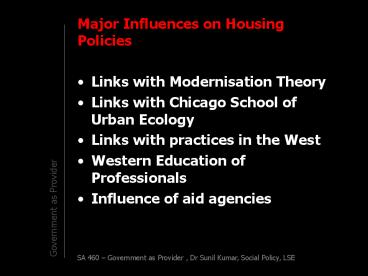Major Influences on Housing Policies - PowerPoint PPT Presentation
1 / 16
Title:
Major Influences on Housing Policies
Description:
SA 460 Government as Provider , Dr Sunil Kumar, Social Policy, LSE. Government as Provider ... formulate proscriptive but not prescriptive laws ... – PowerPoint PPT presentation
Number of Views:82
Avg rating:3.0/5.0
Title: Major Influences on Housing Policies
1
Major Influences on Housing Policies
- Links with Modernisation Theory
- Links with Chicago School of Urban Ecology
- Links with practices in the West
- Western Education of Professionals
- Influence of aid agencies
2
Housing Policy Development
- Economic development seen as key priority -
scarce resources not to be wasted on housing - a
consumption good - Economic growth would create conditions for
improved housing - Urbanisation thrust upon as a necessary process
for economic growth
3
Housing Policy Development
- Prior to 1950 not much interest in housing in
Asia or Africa - poor urban residents accommodated in tenement
buildings - but supply of such accommodation was not
sufficient to cater for urban growth
4
Housing Policy Development
- redevelopment reduced rental housing stock
- development of squatter settlements
5
HOUSING POLICY DEVELOPMENT WESTERN INFLUENCES
GOVERNMENT VIEWS
- The development of slums and squatter settlements
portrayed as a transitory phase that would
disappear as the economy grew
6
HOUSING POLICY DEVELOPMENT1950S
- The persistence of slums and squatter settlements
began to concern government - Illegal low-income settlements seen as cancers
and needed to be eradicated
7
HOUSING POLICY DEVELOPMENT1950S
- common response - slum and squatter clearance -
by bulldozing - dumped in the periphery or in distant
inappropriate sites
8
JUSTIFICATION FOR EVICTIONS
- Improve or beautify the city
- Slums and squatter settlements centres of crime
- Redevelopment
9
IMPACT OF EVICTIONS
- Destruction of few housing options available to
low income groups - - overcrowding as a result of doubling up
- - formation of new squatter settlements
10
IMPACT OF EVICTIONS
- Damage to networks of family, friends and
contacts - - important for day to day survival
- - basis for community mobilisation
11
PUBLIC HOUSING PROGRAMMES
- 1960s and 1970s - launch or enlargement of public
housing programmes - Tried to replicate models of housing in the West
12
PUBLIC HOUSING PROGRAMMES
- 3 main problems with public housing
- Costs were high and therefore few were built
- Middle or upper income groups benefited mostly
- Designs and location ill matched with needs of
poor
13
PROTAGONISTS OF SELF-HELP HOUSING
- John F C Turner
- uncontrolled urban settlements is a manifestation
of normal growth processes - autonomous urban settlements are the product of
and the vehicle for activities which are
essential to the process of modernisation -
location, tenure and shelter
14
PROTAGONISTS OF SELF-HELP HOUSING
- John F C Turner
- autonomous urban settlements are the product of
the difference between the nature of the popular
demand for housing and that supplied by
institutionalised society - institutional control of urban settlements
through encouraging popular initiatives and the
government servicing of local resources
15
PROTAGONISTS OF SELF-HELP HOUSING
- housing should be seen as a verb not a noun
- housing should not been seen as what it is but
what it does - - its meaning for those who use it
- housing needs change over time and cannot be
catered by large organisations with standard
procedures and products
16
PROTAGONISTS OF SELF-HELP HOUSING
- John F C Turner
- this does not do away with a role for government
- enabling - provide services (roads, sanitation, water etc)
- formulate proscriptive but not prescriptive laws
- provide and actively protect access to elements
of the housing process (land, building materials,
tools, credit, know-how)

